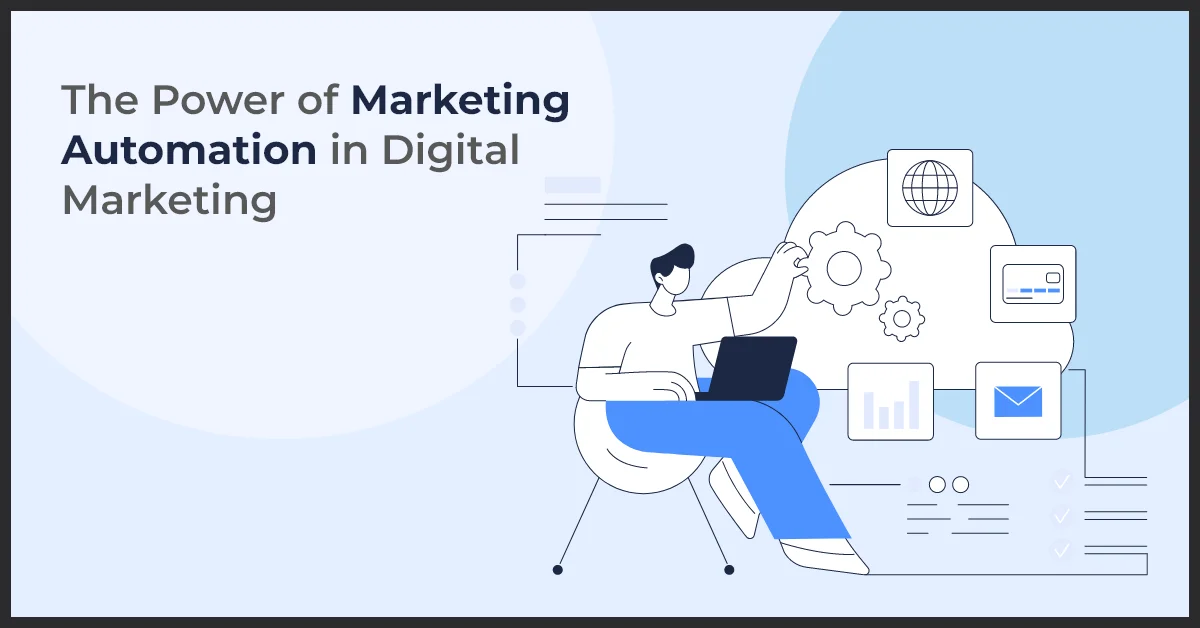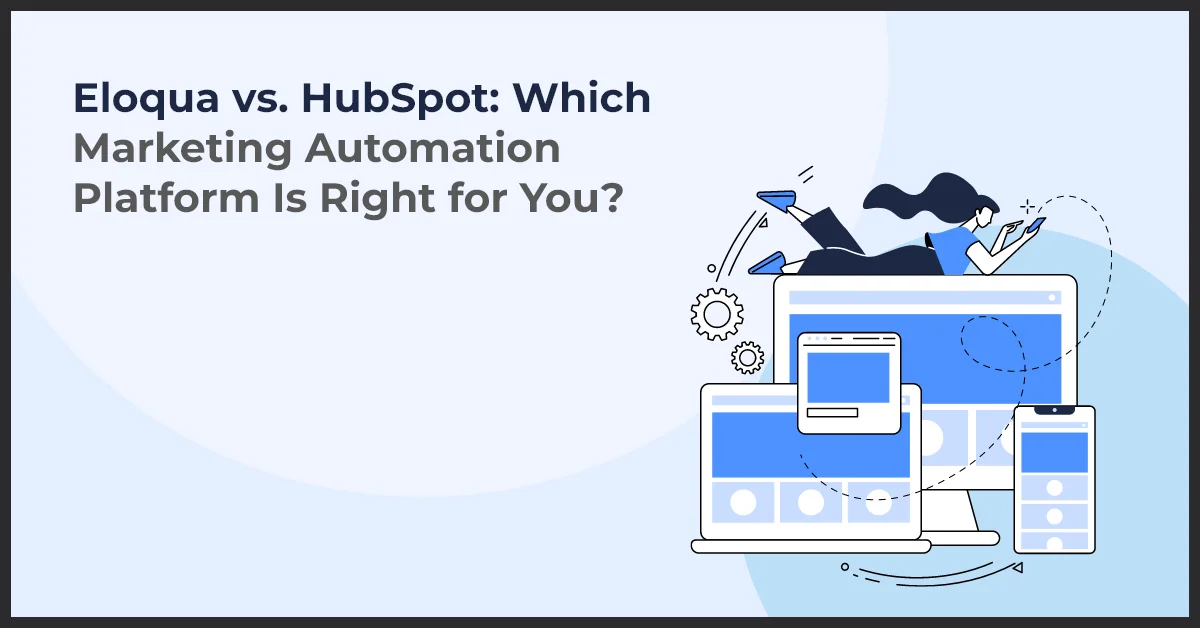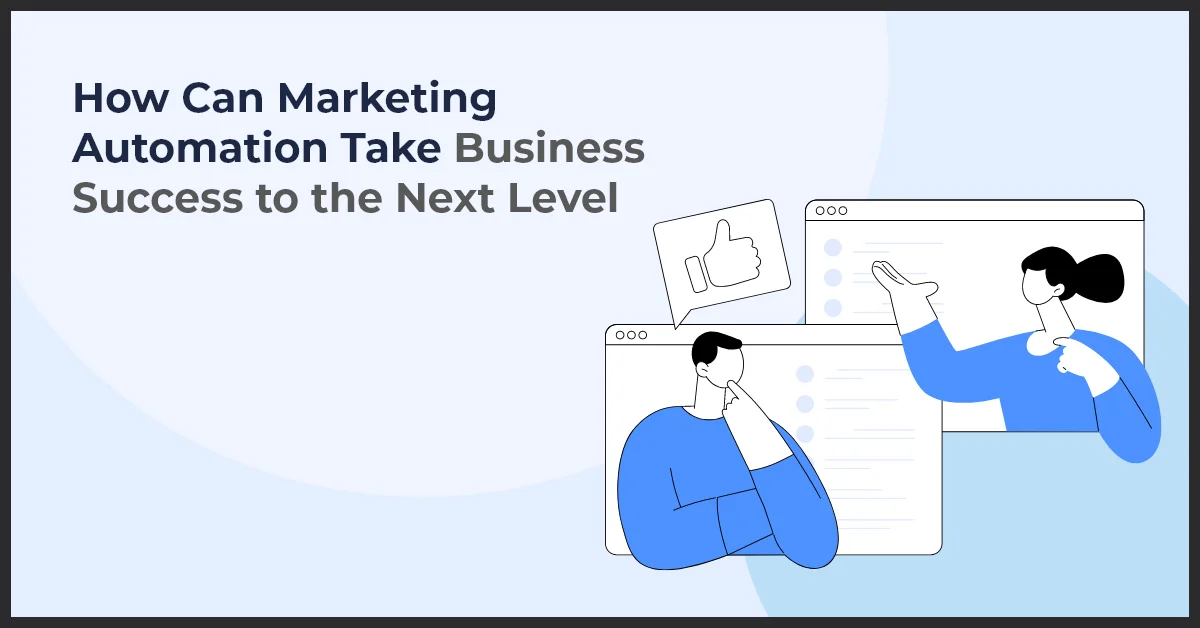How Marketing Automation Transforms Digital Marketing Success

Published on: October 30, 2023
Updated on: February 25, 2025
3895 Views
- Marketing Automation
13 min read
In the fast-paced world of digital marketing, staying ahead of the competition is crucial. With the rise of technology, marketing automation has become a game-changer. This powerful tool not only simplifies marketing processes but also enhances customer experience.
Definition and Benefits of Marketing Automation:
Marketing automation refers to the use of software and tools to automate repetitive marketing tasks, such as sending emails, managing social media platforms, and analyzing data. By streamlining these processes, marketing automation enables businesses to save time, increase efficiency, and achieve greater accuracy in targeting their audience.
Furthermore, the benefits of marketing automation are far-reaching. It allows marketers to create personalized and relevant content, nurture leads, and track customer interactions. This leads to improved engagement, higher conversion rates, and ultimately, greater revenue for businesses.
How does marketing automation enhance digital marketing strategies?
Marketing automation significantly boosts digital marketing by streamlining repetitive tasks and delivering personalized experiences at scale. It allows businesses to automate email campaigns, segment audiences based on behavior, and trigger actions based on user interactions. This results in more targeted and effective marketing efforts, improved lead nurturing, and increased engagement. Automation also provides valuable analytics to measure campaign performance and refine strategies. By integrating marketing automation, businesses can enhance efficiency, drive higher conversion rates, and create a more personalized experience for their audience.
Evolution and Importance of Automation in Digital Marketing
The evolution of automation in digital marketing has revolutionized the way businesses operate. In the past, marketers had to manually manage multiple campaigns and track every customer interaction. This not only consumed valuable time but also limited the potential for growth.
However, with the advent of marketing automation, businesses can now execute complex marketing strategies with ease. From lead generation and nurturing, to personalized email campaigns and social media management, automation has become an indispensable tool for modern marketers.
Role of Marketing Automation in Improving Customer Experience and Streamlining Marketing Processes:
One of the most significant advantages of marketing automation is its ability to enhance customer experience. With the power to deliver personalized content to the right audience at the right time, businesses can provide a seamless and satisfying journey to their customers. This not only boosts customer satisfaction but also leads to increased brand loyalty and advocacy.
Furthermore, marketing automation allows businesses to streamline their marketing processes. By automating repetitive tasks, marketers can focus on strategic planning and creating valuable campaigns. This not only improves overall efficiency but also enables businesses to make data-driven decisions and adapt quickly to market changes.
Marketing automation has transformed the landscape of digital marketing. With its ability to simplify processes, enhance customer experience, and boost business growth, harnessing the power of marketing automation is essential for any forward-thinking organization.
Understanding Marketing Automation
Definition and Components of Marketing Automation
Marketing automation refers to the use of software and technology to automate repetitive marketing tasks, allowing businesses to streamline their marketing processes and improve overall efficiency. It involves the use of various components such as:
- Lead Management: This component helps businesses track and manage their leads throughout the marketing funnel, from capturing leads to converting them into customers.
- Email Marketing: Marketing automation tools often include email marketing features, which enable businesses to automate their email campaigns, personalize content, and track engagement metrics.
- Social Media Management: With marketing automation, businesses can schedule and automate posts on social media platforms, track engagement, and analyze social media metrics.
- Campaign Management: This component allows businesses to plan and execute marketing campaigns, automate workflows, and measure campaign performance.
Key Features and Functionality of Marketing Automation Tools
Marketing automation tools come with several key features and functionalities that aid businesses in their marketing efforts. Some of these include:
- Lead Scoring: This feature helps businesses prioritize leads based on their level of engagement and readiness to make a purchase, allowing sales teams to focus their efforts on highly qualified leads.
- Drip Campaigns: Marketing automation tools enable businesses to set up automated email drip campaigns, which deliver a series of targeted emails to leads, nurturing them and moving them further along the sales funnel.
- Cross-Channel Marketing: Marketing automation allows businesses to communicate with their audience across multiple channels, such as email, social media, and SMS, ensuring a consistent and cohesive brand experience.
- Analytics and Reporting: These tools provide businesses with detailed analytics and reports on various marketing metrics, helping them measure the effectiveness of their marketing campaigns and make data-driven decisions.
Common Terminology and Concepts in Marketing Automation
When diving into marketing automation, it's essential to familiarize yourself with some common terminology and concepts, including:
- Workflow: A workflow represents a sequence of automated marketing actions triggered by specific events or conditions, such as a lead filling out a form or abandoning a shopping cart.
- Segmentation: Segmentation refers to the process of categorizing leads or customers into distinct groups based on specific traits or behaviors. It allows businesses to deliver targeted and personalized marketing messages.
- Nurture Campaign: A nurture campaign involves sending a series of automated and targeted emails to leads or customers with the aim of building relationships, providing valuable content, and moving them closer to conversion.
Different Types of Marketing Automation Platforms and Software
There are various types of marketing automation platforms and software available in the market, catering to different business needs and sizes. Some popular options include:
- All-in-One Solutions: These platforms offer a comprehensive suite of marketing automation features, including lead management, email marketing, social media management, analytics, and more.
- Specialized Solutions: Some platforms specialize in specific areas of marketing automation, such as email marketing automation tools or social media management tools.
- Enterprise Solutions: These platforms are designed for larger enterprises with advanced marketing automation needs and often offer more robust features, scalability, and customization options.
- Open-Source Solutions: Open-source platforms provide businesses with the flexibility to customize and adapt the marketing automation software according to their specific requirements.
Importance of Marketing Automation in Digital Marketing
Marketing automation plays a crucial role in the success of digital marketing strategies. It offers numerous benefits that can significantly impact the overall effectiveness of your marketing campaigns. Here are some key reasons why marketing automation is important in digital marketing:
A. Enhancing Customer Experience through Personalization and Segmentation
With marketing automation, you can create personalized and targeted experiences for your customers. By segmenting your audience based on their interests, behavior, and demographics, you can deliver relevant content and offers that resonate with them. This level of personalization not only improves customer satisfaction but also increases engagement and conversions.
B. Streamlining Marketing Campaigns and Improving Efficiency
Marketing automation streamlines your marketing processes, saving you time and effort. It automates repetitive tasks such as email marketing, social media posting, and lead nurturing, allowing you to focus on more strategic activities. By automating these tasks, you can improve overall efficiency, reduce human error, and ensure consistent messaging across multiple channels.
C. Impact of Marketing Automation on Lead Generation and Lead Nurturing
Marketing automation enables you to capture, track, and nurture leads effectively. By implementing lead scoring, you can identify high-quality leads and focus your efforts on nurturing them. With automated lead nurturing workflows, you can deliver timely and relevant content that guides prospects through the buying journey, increasing the chances of conversion.
D. Improving ROI and Measuring Marketing Campaign Effectiveness
Marketing automation provides valuable insights and analytics that help you measure the effectiveness of your marketing campaigns. You can track key metrics such as click-through rates, conversion rates, and revenue generated to assess the ROI of your marketing efforts. By identifying the most successful campaigns and strategies, you can optimize your future marketing initiatives for better results.
Pro Tip: Enhance customer experiences with targeted personalization and marketing automation. Streamline campaigns, automate tasks, and use analytics to boost ROI and optimize strategies.
Implementing Marketing Automation
Steps to Implementing a Marketing Automation Strategy
Implementing a marketing automation strategy involves several key steps:
- Define your goals: Clearly outline what you want to achieve with marketing automation, such as increasing lead generation, improving customer retention, or enhancing personalization.
- Identify your target audience: Understand who your ideal customers are and segment them based on their demographics, behaviors, and preferences.
- Map your customer journey: Determine the touchpoints your customers go through during their interaction with your brand and identify opportunities for automation.
- Create relevant content: Develop engaging content that caters to each stage of the customer journey and aligns with your marketing goals.
- Set up your marketing automation tool: Choose a reliable marketing automation tool or platform that suits your business needs and offers features like email marketing, lead scoring, and analytics.
- Build your automation workflows: Create automated workflows that trigger actions based on customer behavior or predefined criteria, such as sending personalized emails or nurturing leads.
- Test and optimize: Continuously monitor and analyze the performance of your automation campaigns, making adjustments to improve their effectiveness.
Pro Tip: Start by defining clear goals for your marketing automation strategy. Understand your audience and map their journey. Create relevant content for each stage and set up automated workflows. Regularly test and optimize campaigns to maximize effectiveness and ROI.
Choosing the Right Marketing Automation Tool or Platform
When selecting a marketing automation tool or platform, consider the following:
- Features and functionality: Assess whether the tool offers the necessary features for your marketing automation strategy, such as lead management, campaign tracking, and CRM integration.
- Scalability and flexibility: Choose a tool that can grow with your business and adapt to changing marketing needs.
- Integration capabilities: Ensure the tool can integrate with your existing systems, such as your CRM, email marketing software, or e-commerce platform.
- User-friendliness: Look for a tool that is intuitive and easy to use, enabling your team to effectively manage and create automation campaigns.
- Customer support and training: Consider the availability of support and training resources provided by the tool's vendor to ensure you can effectively leverage its capabilities.
Integrating Marketing Automation Software with Existing Systems
Integrating your marketing automation software with your existing systems is crucial for a seamless implementation. Follow these steps for successful integration:
- Assess compatibility: Ensure your marketing automation software can integrate with your CRM, email marketing software, and any other relevant systems.
- Data synchronization: Set up data synchronization between your marketing automation software and other systems to ensure consistent and up-to-date customer information.
- Mapping data fields: Map the data fields between your systems to ensure accurate transfer of information.
- Test integration: Conduct thorough testing to ensure data flows correctly between your systems and that automation actions trigger as intended.
Considerations for Successful Marketing Automation Implementation
To ensure a successful marketing automation implementation, keep the following considerations in mind:
- Goal alignment: Align your marketing automation efforts with your overall business goals and objectives.
- Quality data: Ensure the accuracy and completeness of your data to benefit from reliable automation and personalized customer experiences.
- Employee training: Provide sufficient training to your team to effectively utilize the marketing automation tool and implement automation campaigns.
- Continuous optimization: Continuously analyze your automation campaigns and make data-driven optimizations to improve their performance.
- Compliance and privacy: Adhere to legal and ethical standards when collecting, storing, and using customer data in your automation efforts.
Pro Tip: Align marketing automation with business goals and ensure data quality for effective personalization. Invest in employee training, analyze campaigns continuously, and maintain privacy compliance for successful implementation.
Key Areas of Marketing Automation in Digital Marketing
A. Email Marketing Automation
- Personalized Email Content and Drip Campaigns: Use marketing automation to create personalized and targeted email content. Implement drip campaigns to engage with leads and move them closer to conversion.
- Triggered Emails Based on User Behavior: Automate the sending of emails based on user behavior, such as abandoned cart reminders or welcome emails for new subscribers.
B. Lead Nurturing Automation
- Tracking Interactions and Segmenting Leads: Use marketing automation to track interactions with leads and segment them based on their behavior, interests, and other variables.
- Delivering Relevant Content to Move Leads closer to Conversion: Automate the delivery of relevant content to nurture leads and guide them through the sales funnel towards conversion.
C. Content Marketing Automation
- Content Creation, Distribution, and Promotion Strategies: Utilize automation to streamline content creation, distribution, and promotion processes.
- Content Scheduling, Syndication, and Social Media Automation: Automate content scheduling, syndication, and social media posting to enhance content visibility and reach.
D. CRM Automation
- Lead Scoring and Sales Funnel Management: Automate lead scoring to prioritize leads and efficiently manage the sales funnel.
- Customer Segmentation and Automated Follow-ups: Segment customers based on various criteria and automate follow-up actions to improve customer engagement and retention.
E. Social Media Marketing Automation
- Scheduling Posts and Managing Social Media Campaigns: Use marketing automation to schedule posts and efficiently manage social media campaigns.
- Monitoring Brand Mentions and Analyzing Social Media Metrics: Automate the tracking of brand mentions and analyze social media metrics to gain insights into brand perception and campaign effectiveness.
F. Marketing Analytics and Reporting
- Automating Data Collection, Analysis, and Reporting: Utilize automation tools to collect, analyze, and generate reports on marketing data for improved decision-making.
- Gaining Insights into Campaign Performance, Customer Behavior, and ROI: Automate the process of gaining insights into campaign performance, customer behavior, and return on investment to optimize marketing strategies.
G. Personalization and Segmentation
- Using Automation to Segment Audiences and Deliver Personalized Marketing Messages: Leverage automation to segment audiences based on demographics, behavior, and preferences. Deliver personalized marketing messages to enhance engagement and conversion rates.
- Improving Engagement and Conversion Rates: Utilize automation to improve engagement and conversion rates by delivering targeted, personalized experiences to individual customers.
H. Landing Page and Website Optimization
- A/B Testing, Adaptive Content, and Website Personalization: Implement automation tools for conducting A/B testing, delivering adaptive content, and personalizing website experiences to optimize conversion rates.
- Optimizing Conversion Rates through Automation: Automate processes to optimize conversion rates by analyzing user behavior, making data-driven decisions, and delivering personalized landing page experiences.
I. Marketing Funnel Automation
- Integrating Automation Tools and Platforms for a Seamless Customer Journey: Integrate automation tools and platforms to automate the entire customer journey, from lead generation to nurturing, conversion, and retention.
- Automating Lead Generation, Nurturing, Conversion, and Retention: Use marketing automation to automate lead generation, nurturing, conversion, and retention activities for a more efficient and effective marketing funnel.
J. Marketing Campaign Tracking and Attribution
- Automating Tracking and Attribution of Marketing Campaigns: Use automation to track and attribute the success of marketing campaigns, enabling data-driven decision-making and optimizing marketing budgets.
- Measuring Campaign Effectiveness and Allocating Marketing Budgets Strategically: Automate the measurement of campaign effectiveness and allocate marketing budgets strategically based on data insights and attribution analysis.
Key Takeaways
- Marketing automation streamlines repetitive tasks, allowing businesses to enhance efficiency and focus on strategic planning.
- It enables personalized content delivery, improving customer engagement and satisfaction, which leads to higher conversion rates.
- Automation tools provide valuable analytics that help measure campaign performance and optimize future marketing strategies.
- Implementing marketing automation helps businesses nurture leads effectively by tracking interactions and delivering timely, relevant content.
- Integration with existing systems is essential for seamless implementation, ensuring consistent data and improved marketing efforts.
Conclusion
Marketing automation plays a crucial role in digital marketing, revolutionizing the way businesses engage with their customers. By automating repetitive tasks and delivering personalized messages, marketing automation not only saves time and resources but also drives engagement and conversion rates.
Throughout this content, we have explored various aspects of marketing automation and its importance in digital marketing. We delved into the introduction and understanding of marketing automation, highlighting its benefits in streamlining marketing efforts and improving customer experience.
Moreover, we discussed the significance of marketing automation in digital marketing, emphasizing its ability to nurture leads, drive revenue growth, and increase customer retention. Supporting this with relevant statistics and case studies, we witnessed how companies have achieved exceptional results by implementing marketing automation strategies.
Implementing marketing automation requires careful planning and execution, as discussed in section four. We explored how to identify the right marketing automation platform and create effective campaigns that deliver relevant and timely messages to your target audience. Through proper implementation, businesses can enhance their digital marketing efforts and gain a competitive edge.
In section five, we examined the key areas of marketing automation in digital marketing, such as lead nurturing, email marketing, social media automation, and campaign tracking. By leveraging these areas effectively, businesses can create personalized experiences for their customers and achieve higher marketing ROI.
In conclusion, marketing automation is an indispensable tool for digital marketers. It enables businesses to automate repetitive tasks, personalize their messaging, and optimize their marketing efforts. By implementing marketing automation strategies, companies can improve customer engagement, generate more leads, and drive revenue growth.
Looking into the future, marketing automation will continue to evolve as technology advances and consumer trends change. With the increasing demand for personalized experiences, marketing automation will play a vital role in shaping the digital marketing landscape. Businesses that embrace marketing automation will be well-positioned to stay ahead of the competition and drive sustainable growth.
FAQs
Marketing automation enhances digital marketing by personalizing customer experiences, improving lead nurturing, increasing efficiency, and providing detailed analytics. It helps in managing multiple channels, automating repetitive tasks, and delivering targeted content at the right time.
Key features typically include email marketing, lead management, CRM integration, social media automation, analytics and reporting, landing page creation, and campaign management. Advanced platforms may also offer AI-driven insights and personalization.
Challenges include the initial cost and complexity of setting up the system, the need for ongoing management and optimization, potential integration issues with existing tools, and ensuring data quality and compliance with privacy regulations.
Marketing automation positively impacts customer experience by delivering personalized and timely communications, providing consistent engagement across channels, and quickly responding to customer actions and behaviors. This results in a more relevant and satisfying customer journey.
Yes, marketing automation can significantly aid content marketing by automating content distribution, personalizing content recommendations, tracking engagement metrics, and optimizing content strategies based on performance data.



